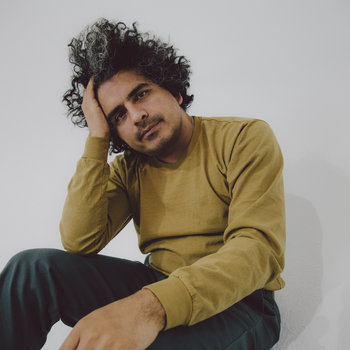
Records from a diverse community of Latin musicians in the Americas and around the world can be found on Bandcamp. Each month, Maria Barrios will cover the best in cumbia, Afro-Latin dance music, Latin soul, bossa nova, and everything in between. February’s edition features a standout new album by Helado Negro, experimental music from Bolivia, a glorious reissue of Nicaraguan funk outfit Poder del Alma, and much more.
Helado Negro
PHASOR








Vinyl LP, Compact Disc (CD)




Back in 2019, I was slated to write my first feature for The Washington Post: an interview with Helado Negro, aka Roberto Carlos Lange, about his excellent fifth LP, This Is How You Smile. My transcription of the interview is short but to the point. “I grew up listening to a lot of Latin American pop, folk, and boleros, like Julio Jaramillo,” Lange said. “But in terms of musical construction, I never try to take a portion of a form of music and say ‘I’m gonna take this and make it my way.’ It’s not something that I can do.”
Lange also talked about his love of experimental music: “In my mind, making songs is sound art. I went to school specifically for computer animation but also studied a lot of sound design and, at the time, was heavily focused on sound in fine arts, meaning I was doing sound installations.”
None of these quotes made it into my piece, and after a first draft, a set of illegible notes, two rewrites, and 11 emails between my editor and myself, the article wasn’t published. But that initial failure taught me a lot. I kept writing; Helado Negro signed with 4AD and released Far In in 2021.
His new album, Phasor, is, to put it quite simply, a miraculous listen. Glistening with electronic textures, soft vocals in Spanish and English, and rich layers of oscillations, Phasor is loaded with poetry, both sonic and lyrical. From the charming “I Just Want To Wake Up With You” to the expansive “Out There,” where Lange’s explorations in sound reach new heights, Phasor glides—there is love, grace, and breezy beats for days. “There’s not necessarily an initial underlying theme that I’m working with when I’m building,” Lange told me back in 2019. “More than anything, I’m trying to let the feeling of excitement and curiosity navigate the sounds.” That feeling still stands.
Daymé Arocena
Alkemi



Vinyl LP

Billed as a “fusion of neo-soul singing, Afro-Caribbean beats, and slick, new Millennium pop,” Afro-Cuban singer Daymé Arocena’s Alkemi is an exultant experience. Backed by impeccable production from Eduardo Cabra of Calle 13 fame, Arocena shines on reggaetón-adjacent track “Suave y pegao.” The funky “American Boy” mixes Afro-Caribbean rhythms with Arocena’s heartfelt vocal delivery. Dripping with sensuality, “A fuego lento,” a duet with Dominican singer Vicente García, is the album’s standout track, an example of Arocena’s innate talent for pop songs. “El amor la esperanza” continues in this vein, evoking Sade’s “Your Love Is King,” a kind of Latin-tinged trip-hop. As a whole, Alkemi channels different aspects of Arocena’s immense creative talent as a jazz singer, composer, and bandleader into a spiritual, romantic, and danceable record.
Maria Rita
Brasileira
Brazilian singer Maria Rita’s spectacular voice resonates throughout her 1988 debut, Brasileira. Reissued by British label Mr. Bongo, Brasileira is a standout listen and a versatile record where Rita’s vocals shift between powerful laments and anthemic ballads about her home country. Opening track, the trance-like “Cântico Brasileiro No.3 (Kamaiurá),” earned itself a place on international dancefloors decades after its release with its futuristic beats. Piano melodies, delicate percussion, and flourishes of synthesizers give Brasileira an ethereal, almost New Age feel, weaving the influence of artists such as Milton Nascimento, Yma Sumac, and Mercedes Sosa into a forward-thinking and unique record.
Ana Tijoux
Vida


After a 10 year hiatus, Chilean rapper Ana Tijoux returns with Vida, a defiant celebration of life and a continuation of the artist’s message of solidarity, political activism, and love. A gifted Latina rapper, Tijoux has been performing since the age of 18, her flow evoking artists such as Mala Rodríguez, Actitud María Marta, and Sara Hebe. Vida’s 15 tracks represent Tijoux’s sensibilities as a mature artist, shifting focus to her loved ones, speaking to women’s empowerment, and addressing South American history. Born in France after her parents fled the Pinochet dictatorship, Tijoux makes room for Estela de Carlotto, an Argentine human rights activist, in the spoken intro for her song “Busco.” Featuring Puerto Rican singer iLe, “Busco” speaks to the victims of the military junta who are still unaccounted for. It is in songs like “Tu sae” and “Dime qué,” though, that Tijoux’s sharp tongue and lyrical prowess stand out, making Vida a compelling listen, fully formed and carefree, as if Tijoux had never gone anywhere.
Cergio Prudencio
Antología 1: Obras para la Orquesta Experimental de Instrumentos Nativos



2 x Vinyl LP

Charangos, sikus, water drums, and flutes appear across nine pieces capturing the work of Bolivian composer, conductor, teacher, and poet Cergio Prudencio. Prudencio’s work is inextricably tied to the Orquesta Experimental de Instrumentos Nativos (Experimental Orchestra of Native Instruments), which he has run for the past 40 years. Aimed at joining avant-garde music with native Andean instruments from the Aymara and Quechua indigenous communities, the work of Prudencio’s orchestra is atmospheric, dissonant, and multi-layered. On opening track “Cantos Insurgentes,” 24 musicians alternate in time, creating waves of wind and percussion that, in crescendo, appear to explode into one long scream. The five-part “Otra ciudad” is a conceptual work written for sikus (a type of pan flute). With shifting pitches, voluminous bursts, and almost cavernous pauses, “Otra ciudad” speaks to Prudencio’s unique vision. By embracing autochthonous instruments and honoring the legacy of the communities that made music before him, Prudencio brought those sounds into the future.
Mexican Institute of Sound
Algo-Ritmo: Mexican Institute of Sound Hits 2004-2024


2 x Vinyl LP




Since 2004, Mexico City DJ and producer Camilo Lara has been creating music that blends sampledelia, cumbia, electronica, and lo-fi. His discography includes guests such as Graham Coxon, Toots & The Maytals, Tom Tom Club, and a credit as a creative consultant on the Pixar film Coco (2017). It is no surprise that, after decades of outstanding work capturing Mexico’s musical legacy, Lara’s music is getting a well-deserved retrospective. Algo-Ritmo: Mexican Institute of Sound Hits 2004-2024 captures his best work. From the hip-hop-inspired “El Micrófono” to the existential, hilarious plea of “Dios” (where Lara posits that if he met God, he would ask for some quesadillas), Lara dazzles with his ability to bring forth boleros, bombastic cumbias, and even a little dembow. Combining loops, obscure samples from the ‘60s, and his singing—somewhere between Plastilina Mosh, The Avalanches, and Beastie Boys—Lara’s Algo-Ritmo: Mexican Institute of Sound Hits 2004-2024, is a brilliant one-man sound experiment.
La Banda Pablito C
¡Piú Piú! Él Laser!
“ME PAGARON HOY EN EL TRABAJO!” (I GOT PAID TODAY AT WORK!) declares the description of ¡Piú Piú! Él Laser! From Massachusetts cumbia project La Banda de Pablito C. Pressed to find out more, I reached out to DJ Mayday, the musician and producer behind the group. In response, I got a one-page press release (written by DJ Mayday himself) that only deepened my interest. What is DJ Mayday doing in Quincy, Massachusetts? How does he know about cumbia villera? Are we all missing out on amazing basement parties that are somehow taking place in the same city where Dunkin’ Donuts was born? Conjectures aside, ¡Piú Piú! Él Laser! is the band’s first album: a jaunty mix of DIY recordings, cumbia sonidera, and reggaetón, with lyrics about taking a trip to the liquor store, smoking weed, and even a “Gringo Party Interlude,” complete with what sounds like a sample of Nelly’s hit “Dilemma.” Experimental and a little rough around the edges, ¡Piú Piú! Él Laser! is strange and fun, a reminder of how freeing music can be when you have good ideas and mixing gear at home.
Poder del Alma
Poder del Alma II



Vinyl LP

According to their Bandcamp page, Nicaraguan band Poder del Alma was assembled to play as Santana’s opening act for a benefit concert in 1972. Composed of 11 musicians with ties to Nicaragua’s hippie scene, the group recorded three albums between 1973 and 1977, finally disbanding in 1979. Pure psychedelia and Latin funk, Poder Del Alma II opens with “Bacanal 76”— to say this song is “high energy” would be an understatement. It is as if the group goes from 0 to 100 in five seconds by way of a relentless descarga: all horns, interlocked percussion, and LSD-fueled electric guitar. Follow-up tracks “Amanecer Entre Las Hojas” and “Mimo” are more elastic, with some wild touches of Minimoog. A compelling document of the Nicaraguan hippie scene grounded in salsa and funk, Poder del Alma II will appeal to fans of Cortijo’s contemporaneous ’70s experiments (Cortijo y Su Maquina del Tiempo) and the Fania Records catalog.







